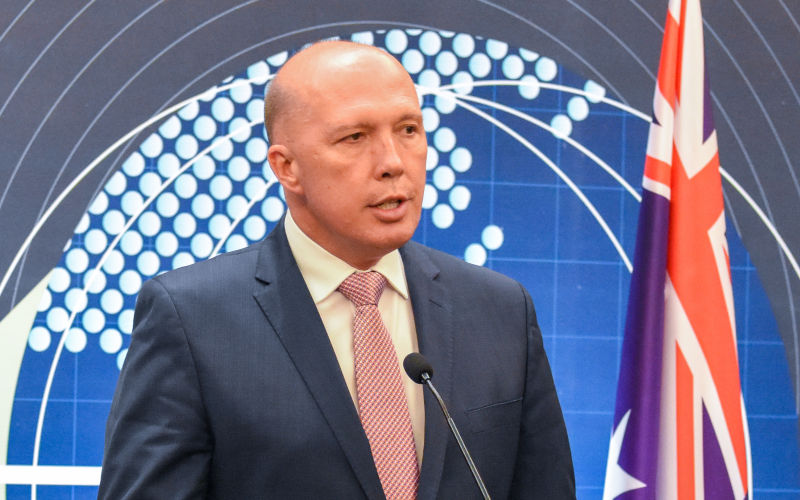The unplumbed depths of Peter Dutton cynical politics should be a matter of deep concern to genuine political conservatives across Australia. Whoever those people are (at present they appear to be in hiding), it’s time they distanced themselves from what the Liberal Party is becoming under Dutton’s leadership.
What should a genuinely conservative political party be like in the context of contemporary Australia?
Modern conservatism has been greatly influenced by the writings of the Anglo-Irish intellectual, Edmund Burke (1729-1797) who was an MP in the British parliament from 1766 to 1794. Burke believed that society was a richly woven web of human relationships. Radical change would threaten the delicate balance of those relationships, possibly leading to their collapse. While acknowledging that reforms were necessary, he argued that they should be introduced cautiously, piecemeal and gently, giving people time to become accustomed to new arrangements in society.
However, Burke was by no means what Marx would call a “dead hand” on the march of history. He was a passionate advocate for Irish independence, much to George III’s annoyance and that of dyed-in-the-wool Tories. His stand won him the enmity of rapacious English landlords in Ireland. He supported the American colonists’ demands for “no taxation without representation.” He was one of those rare politicians who hold firmly to their moral principles, unswayed by critics and opponents.
Policy gradualism, a deep respect for enduring social institutions, and the valuing of the traditions of diverse communities are what characterise genuine conservatives today. They are experts in what the philosopher Charles Taylor calls “the politics of recognition”, acknowledging and enjoying the historical integrity and plurality of cultural differences, while supporting policies that protect and nurture the cohesion of the always fragile balancing of society. They shun the politics of division and pay-back. They are unmoved by glib ideologies like neoliberalism.
Is there evidence of genuine political conservatism present in Australia today? We should expect to find it as a significant element, a persuasive presence, in the Liberal Party. However, when we look at contemporary Liberal leaders, there is no sign of a Burkean influence, much less of an understanding of the philosophical bases of conservative ideas in their political imaginings. Instead they are the bitter proponents of what can only be understood as reactionary politics, or the politics of negative expediency and ideological dogmatism.
The fact is that the contemporary Liberal Party of Australia has become a sad relic of what a genuinely conservative party should be. Appropriated by religious zealots, neoliberal ideologues, and wall-eyed reactionaries, it is now a dangerously illiberal and divisive force in Australian politics. Its reactionary “policies” (they are more like slogans) echo many of the alarming restrictions that the Republican Party is imposing on women, ethnic minorities, unions, and the LGBQI+ communities in the USA.
Nowhere is this more evident than in Liberal leader Peter Dutton’s cynical approach to politics. Outflanking John Howard, he has become the most anti-conservative politician Australia has had to endure since the end of World War II. He is a typical reactionary, incapable of offering critical insights of governmental proposals, only insults, never providing practical alternatives. Policy negativism is his mantra. He has no inspiring way forward for Australia’s advancement to offer to voters.
While critiquing government policy is the job of an opposition leader, it has to be based on a cogent alternative policy program. This is glaringly absent from Dutton’s agenda. We have no idea what he would propose as the “alternative government.” In fact, there is simply no alternative, no policy vision, being offered in the grim Duttonian scheme of political things.
Dutton’s campaign against the Voice to Parliament referendum is grim evidence of his cynical politics. There is no principled element in his No campaigning. He is bent on dividing the country in order to defeat the proposed constitutional protection for an Indigenous Voice able to advise the parliament. It is indicative of political narcism, of wanting to seize power by any means. He has no sympathy for, or understanding of the destructive racial divide that has resulted in so much misery for Aboriginal and Torres Strait Islanders ever since the arrival of the first fleet in 1788.
His opposition to the Voice to Parliament can only be understood as coming from entrenched racism. We’ve seen this rear its hideous face before – for example, in his walk-out from Kevin Rudd’s apology speech in the Australian parliament, in his claims about African youths frightening away restaurant goers in Melbourne, in his sarcastic remarks about South Pacific leaders coming late to a meeting with him and other Australian officials. There is a stridency in his critique of the Voice, echoing elements of Nazi propaganda in the past, and this should be alarming to genuine conservative as well as all fair-minded Australians.
Implied in his negativism to almost any policy proposed by the Albanese government is a resentment of the fact that he and his Coalition MPs are no longer in power. It’s as if he can’t believe that what he stood for, and supported, during the shocking years of the Abbott-Turnbull-Morrison governments has been rejected by Australian voters. Saying no comes naturally to him. It is his only recourse. There is no ethical depth or philosophical gravitas driving his politics, just a knee-jerk response to anything that seems to him to be a rejection of the Liberal Party that he now heads, dragging it in his wake the right on the Australian political spectrum.
This demonstrates that the contemporary Liberal Party is neither liberal nor conservative. The unspeakable cruelty of the Robo Debt scandal, the maltreatment of asylum seekers, the sports (and other) rorts, the devastating revelations about the corrupt practices of private consultancies, the abject failure to respond intelligently to the dire challenges of climate change, potential corruption in the ranks of Liberal and Coalition MPs (we await the findings of the NACC), and the multi-ministerial self-appointments of Scot Morrison all constitute a gaping wound on the recent history of Australian politics. Dutton was a major contributor, implicitly and explicitly, to this sad era which has brought about the death of political conservatism in this country.
It is likely that Malcolm Fraser was the last genuine conservative in Australian politics. True, the manner in which he came to power, following the grotesque gubernatorial sacking of Gough Whitlam, was uncharacteristically anti-conservative. However, his welcoming of Vietnamese boat people after the Vietnam war, his maintenance of the Whitlam government’s approach to Indigenous land rights, his championing of multiculturalism, his standing up to Margaret Thatcher over the old Rhodesia and apartheid in South Africa, and his opposition to John Howard’s doctrinaire neoliberalism demonstrate his ethically and philosophically grounded understanding of what it means to be a genuine conservative.
To their eternal credit, Malcolm and Tammy Fraser walked away from the Liberal Party, horrified by what it had become under Howard and his successors – especially, but not only, in regard to asylum seekers. All genuine conservatives (if there are any such people left in the party) should follow the Frasers’ example and quit the Liberal Party altogether. Dutton’s cynical politics now hold sway. The Liberal Party has become an ugly refuge for recalcitrant reactionaries, leaving the Australian body politic much the poorer.
Dr Allan Patience is an honorary fellow in political science in the University of Melbourne.

